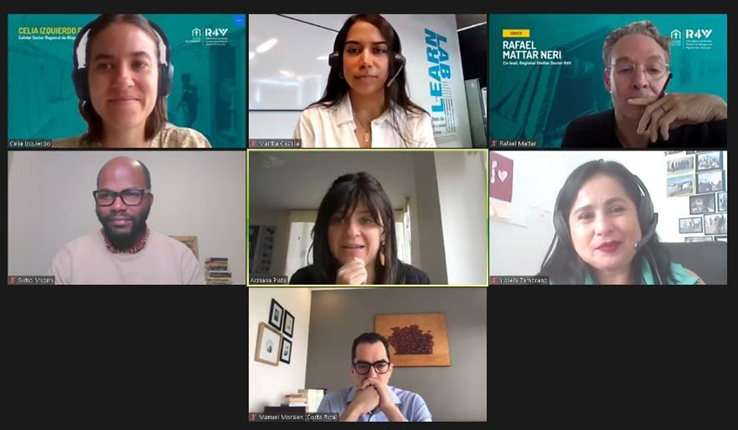Within the framework of World Cities Day, the webinar “Building more inclusive cities in Latin America and the Caribbean, and other international experiences” was held in order to generate a space for dialogue so that different actors could share their knowledge and experiences leading projects or initiatives that seek to provide an inclusive and sustainable response to the challenges and opportunities resulting from the rapid growth of cities that host groups in a situation of human mobility.
The space, organized by the UN Habitat agency and the “Inclusive Cities Communities of Solidarity” project, in conjunction with the R4V platform and the housing sector, was the setting for the exchange of experiences of municipalities from the global south with Zama Khuzwayo, from the municipality of Durban (South Africa) and Mauricio Aguas, Secretary of Social Development of the city of Cúcuta (Colombia). This exchange gave an account of the different actions carried out, in the case of the government of Cúcuta, to address the migratory challenge that the passage of more than 6 million Venezuelans through this border city represents, with campaigns and spaces that seek to prevent xenophobia and provide health services, education and urban spaces for all. Similarly, in the case of Durban, the prosperity approach that the municipality has had with respect to refugees, migrants and victims of displacement who come to settle in urban areas and the importance of coordinated actions towards development was made known.
Also, through the experience shared by Sandy Kumar, Rowaida Dweik and Ayah Hammadmohd, representatives of the Urban Planning and Infrastructure in Migration Contexts (UPIMC) project, it was possible to learn about the work that this initiative has carried out in the countries of Jordan, Cameroon and Egypt to contribute to national and international efforts to improve access to services, socioeconomic opportunities and infrastructure for displaced populations and host communities in challenging situations.

The experiences shared led to a panel discussion moderated by Celia Izquierdo and Rafael Mattar, representatives of the housing sector of the R4V platform, in which Sikho Msomi of City People (Durban, South Africa) and Yisella Zambrano of AVSI (Manta, Ecuador) discussed the role of NGOs as vehicles that help strengthen the community, facilitate inclusion and support the socio-economic challenges faced by refugees, migrants and host communities, becoming key allies of local governments.
An additional point of view the space had was that of the academy, thanks to the contributions of Manuel Morales, from the University of Costa Rica, and Martha Castilla, from the Universidad del Norte (Colombia). Both highlighted the ability of academia to rethink and redefine not only the role of architects but also that of all those who play a role in society to adapt urban dynamics to a better, more inclusive and resilient outcome, encouraging communities to strengthen their capacities, improve their territories and increase their resilience, also highlighting the autonomy of institutions to give continuity to initiatives and make them more sustainable over time and community outreach.
Finally, all participants highlighted the relevance of the exchange, assuring that it is of great value to nurture the reflections that each one makes on their own initiatives and highlight the synergy they create by leading projects not only through interventions and institutional support but also through the impact they have on the lives of a large number of communities globally.